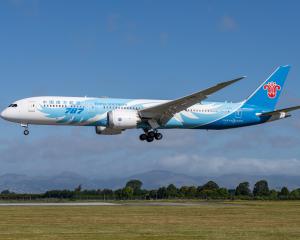Jade managing director David Lindsay is decidedly upbeat when he emerges through security doors to greet the Otago Daily Times.
The previous 12 months had been ''exciting'', significant growth having been achieved by the company, which is becoming a dominant global force in the logistics software market.
''The nice thing for us is growth usually comes in pockets. One product might do well or one part of the business might do well. Now, growth is across all parts of the business.
''I have been with the company for 16 years and this is the most growth I have seen during that period. It's a good place to be in.''
One of the drivers of the recent growth was the growing logistics market, where Jade excelled in providing ports with software to monitor cargo.
But Jade was also working on enterprise apps for mobile devices and connecting banks with their customers in a myriad of ways, he said.
Invercargill-based SBS Bank and Taranaki-based TSB were customers.
Businesses were looking at how they could interact with their customers at any time in real time.
''All of that has generated demand from customers.''
Mr Lindsay forecast a strong financial result for the end of the current financial year.
In 2011, Wynyard, which was a part of Jade, was separated out and listed on the NZX. Wynyard specialises in crime-fighting solutions.
Mr Lindsay said there was some concern about the separation and how it would impact on Jade but the growth for the software company started to show through from the separation.
Jade retrained its focus on logistics products, which are used in New Zealand ports such as Port Otago, one of the original adopters of the software.
''This is a race to be the top provider in this $US500 million ($NZ614 million) annual market. There is clear space between us and the few competitors in the market.''
Jade also made a decision early in its business plan to provide the best customer support it could - the well-known but not often adopted principle of ''think globally, act locally'', he said.
Jade had support people in the Middle East and the United States for 24-hour, seven-day-a-week support in the local time zones.
Dubai staff numbers would double in the coming year and Jacksonville staff, in the US, would also increase.
What gave Jade an edge in the market was its focus on mixed cargo, Mr Lindsay said. Also, the ''painless implementation'' of Jade's software gave it a competitive advantage.
In Jacksonville, the program took three months to install. A competitor was still struggling to implement its program in New York after two years. While Jade adapted its program to suit the customers, the New York program required the port authority to change its practices.
''Our program is easy to explain and take them through it. We can show what the product can do.''
While competitors could cope with providing a container ship's cargo with one ID number, Jade's strength was in enabling the cargo to be broken up into pallets, cases or anything that went on to a ship in a container.
Different customers could then track their own cargo.
Mr Lindsay praised Port Otago's help in developing the software as the port was a mixed cargo port and Jade and the port company had developed ''deep collaboration''.
Sir Gil Simpson founded Aoraki Software, followed by Linc, in Christchurch around 35 years ago. Sir Gil's philosophy was taking software to the world and the philosophy had not changed, Mr Lindsay said.
The company encouraged innovation from its staff to bring ''what-if'' solutions to the discussion. A solution might work for one customer and, with some tweaking, could work for another customer with a complex problem to solve.
''We have a short, tight and easy process to run through. We want to encourage innovation. We have been doing that for 35 years and we won't be stopping. Staff morale will be high if they feel they can come up with the next big thing. It's fantastic.''
While Jade attracted innovative people to its doors, Mr Lindsay worried that skilled people were in short supply. He did not believe the education system was ''really pushing'' IT for pupils and students.
''Primary schools do a good job but it dies at high school. And they don't follow through at university. It's a lot easier overseas, to be honest.''
Jade also made an effort to hold on to the staff it had. It has staff training, but not as you would expect it to be.
The human resources programme runs pilates and yoga classes, boxing and car racing and a few people jump out of planes. Those situations were used to break down barriers between departments.
Jade was flexible with its working hours, allowing parents to look after children, for instance. But with mobile access and broadband, staff were online anytime.
''We love to read emails and work. It is hard to switch off. Our work style is constantly to work and we need to make that work for families.''












